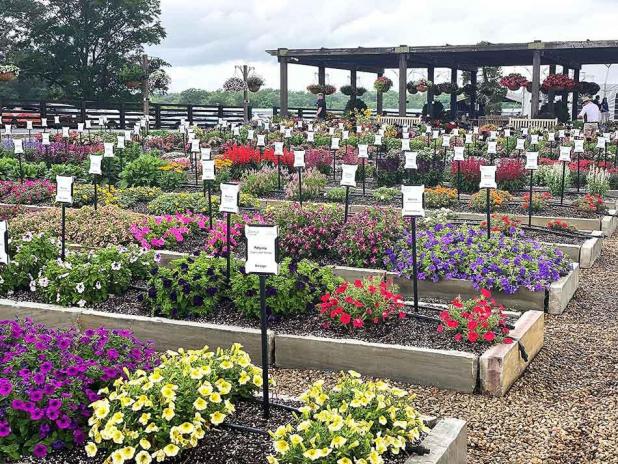
Some large growers have their own trial gardens open to the public, such as Young’s Plant Farm in Auburn, Alabama.
—LSU AgCenter/Heather Kirk-Ballard
Get It Growing: Take advantage of trial gardens
I recently visited a few trial gardens across the South to see what’s new in the ornamental plant world. I saw some wonderful plants and got excited about some of the up-and-coming cultivars being tested for use in the landscape.
Trial gardens provide us important information about growth habits of new plants varieties and how they perform in different USDA hardiness zones. They feature new and improved cultivars, usually achieved through plant breeding. In some cases, entirely new plants are evaluated. The gardens provide useful data for plant breeders, growers and consumers alike.
There are many types of trial gardens. There are those run by plant breeders, large companies, public gardens and, of course, land-grant universities such as the LSU AgCenter. Testing organizations such as All-America Selections coordinate trial gardens in more than 40 locations across the United States and Canada. No doubt, trial gardens can be found in just about every country.
The All-America Selections highlight flowers and vegetables that have been “Tested Nationally and Proven Locally” through participating trial gardens spread across North America.
Louisiana has its own trial garden programs and plant promotions specifically for our unique growing conditions. Plants that are considered superior in gardens across the state are named Louisiana Super Plants.
The program carries its own unique slogan of “University Tested and Industry Approved.” Louisiana Super Plants have been tested at research stations across the state.
LSU AgCenter plant trials and ornamental research are mainly carried out at the Hammond Research Station and the Botanic Gardens at Burden. These two gardens are the largest trial gardens affiliated with LSU.
However, plant trials are carried out at AgCenter research stations all over the state in some capacity. Though some are dedicated to certain commodity crops, ornamental plants also make an appearance at most stations. Other public gardens and independent growers have their own trials often open to the public.
Trial gardens measure how well a specific cultivar or variety will perform in a specific area or growing condition. The trials evaluate new varieties compared to an industry standard plant from germination to maturity or from seed to harvest. Plants are trialed in several different environments to evaluate their performance in that area under specific conditions.
Plants are evaluated for different lengths of time depending on the life of the plant. For example, an annual may be evaluated on an annual basis for two growing seasons, or a two-year period. Perennials would be evaluated over a few years, and shrubs and trees would be evaluated for many years.
During the evaluation, observations are made on the growth vigor, visual quality, and light and water requirements in addition to disease and pest resistance, drought or excessive water tolerance. Growth habit in-formation such as trailing versus upright, dwarf versus large specimens, evergreen versus deciduous, flower color and size in addition to any other useful information is recorded.
Photos and videos are powerful tools for highlighting plant qualities. As the saying goes, a picture is worth a thousand words. But if you are a true scientist, you will appreciate all of the data provided by the research as well. This information is shared with growers, breeders and consumers. Plants that perform well in trials typically can be found in independent garden centers the following season or in the near future.
By visiting local trial gardens in your area, you can see what has potential to be a good performer in your landscape or gardens. Visit the Hammond Research Station website, https://bit.ly/3xpSTVE, for virtual tours of the gardens and results of garden trials. Large garden industry companies also share listings of plant trial gardens and annual results by geographic region on their websites.
Find the next great plant for your landscape from the comfort of your living room chair, or get outside and enjoy the beauty of trial gardens and talking with other avid gardeners and admirers.
